With 'My Old Ass,' Megan Park Masters the Coming-of-Age Movie
The director discusses filming her second feature starring Maisy Stella and Aubrey Plaza.
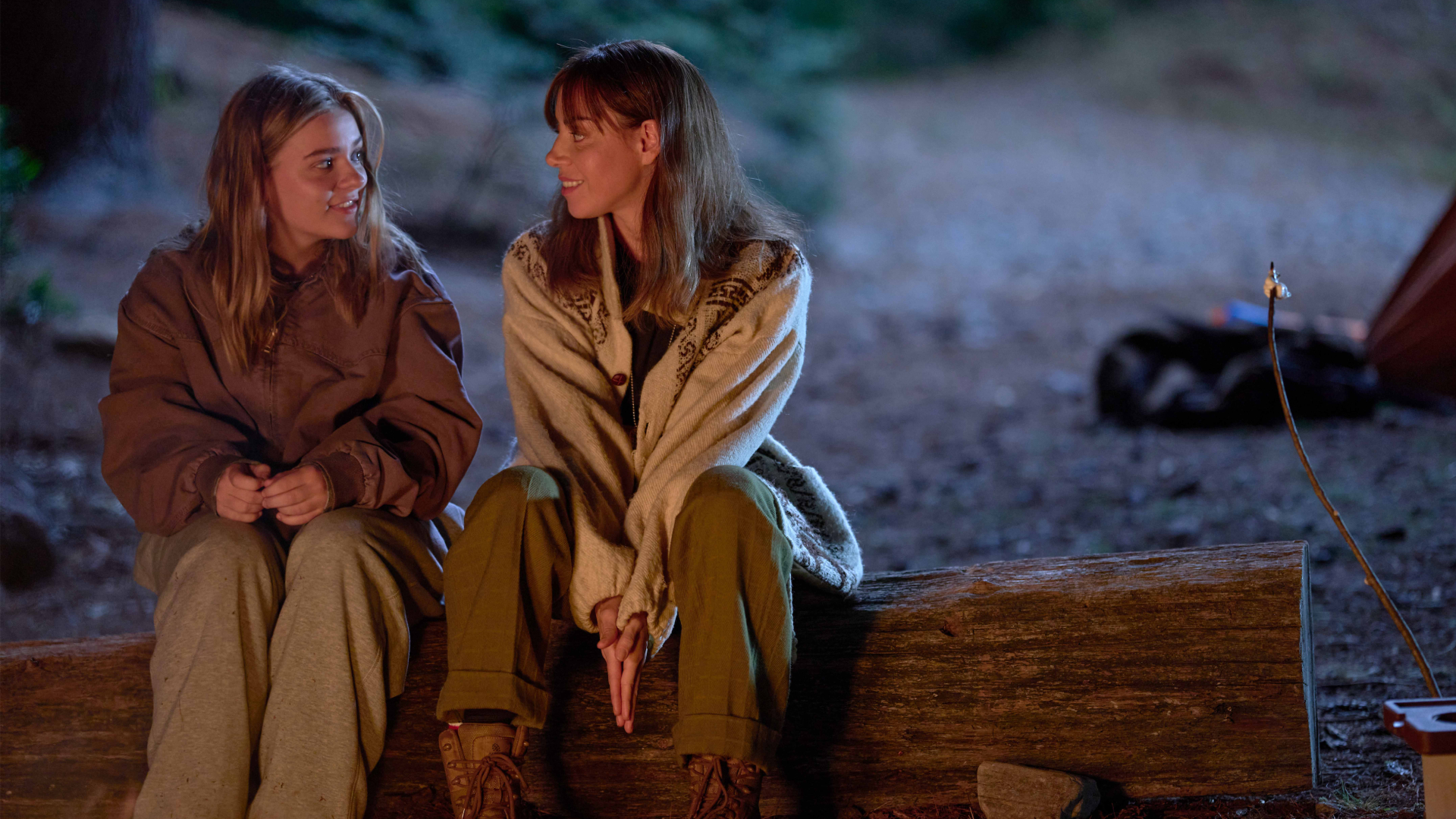
Megan Park knows it’s hard to create a perfect coming-of-age film—from both in front of and behind the camera. The Canadian filmmaker, 38, was among the ensemble on the classic ABC Family teen soap The Secret Life of the American Teenager for over 100 episodes, before transitioning from acting to writing and directing with the 2021 high school-set drama The Fallout, starring a pre-Wednesday Jenna Ortega. Park impressed festival audiences with her award-winning film about a student reeling from trauma following a school shooting—and her latest project My Old Ass, captures another lightning-in-a-bottle moment. Like her directorial debut, Park’s sophomore feature tells a mesmerizing, authentic Gen Z story and finds another breakout talent in Maisy Stella.
My Old Ass is a different kind of coming-of-age story—one where Stella’s high school grad character Elliott has the privilege of being guided into young adulthood by the older version of herself (played by Aubrey Plaza), who appears to her while she’s high on shrooms. The film is best experienced with no spoilers besides the one warning the elder Elliott, nicknamed My Old Ass by teenaged Elliott, gives her younger self: Stay away from a guy named Chad. The subsequent journey of angst, questioning, and growth, undertaken during Elliott’s final days before heading from her home on a cranberry farm to the big city of Toronto for college, was created with care and empathy, with Park cultivating a set where Stella and the film’s other young stars (including Maddie Ziegler and Kerrice Brooks) felt comfortable.
“[Maisy and I] had a lot of shared experiences in terms of what it feels like to feel a little bit powerless on a set, especially as a young woman,” Park tells Marie Claire. “I really tried to hopefully create an environment that's the opposite of that.”
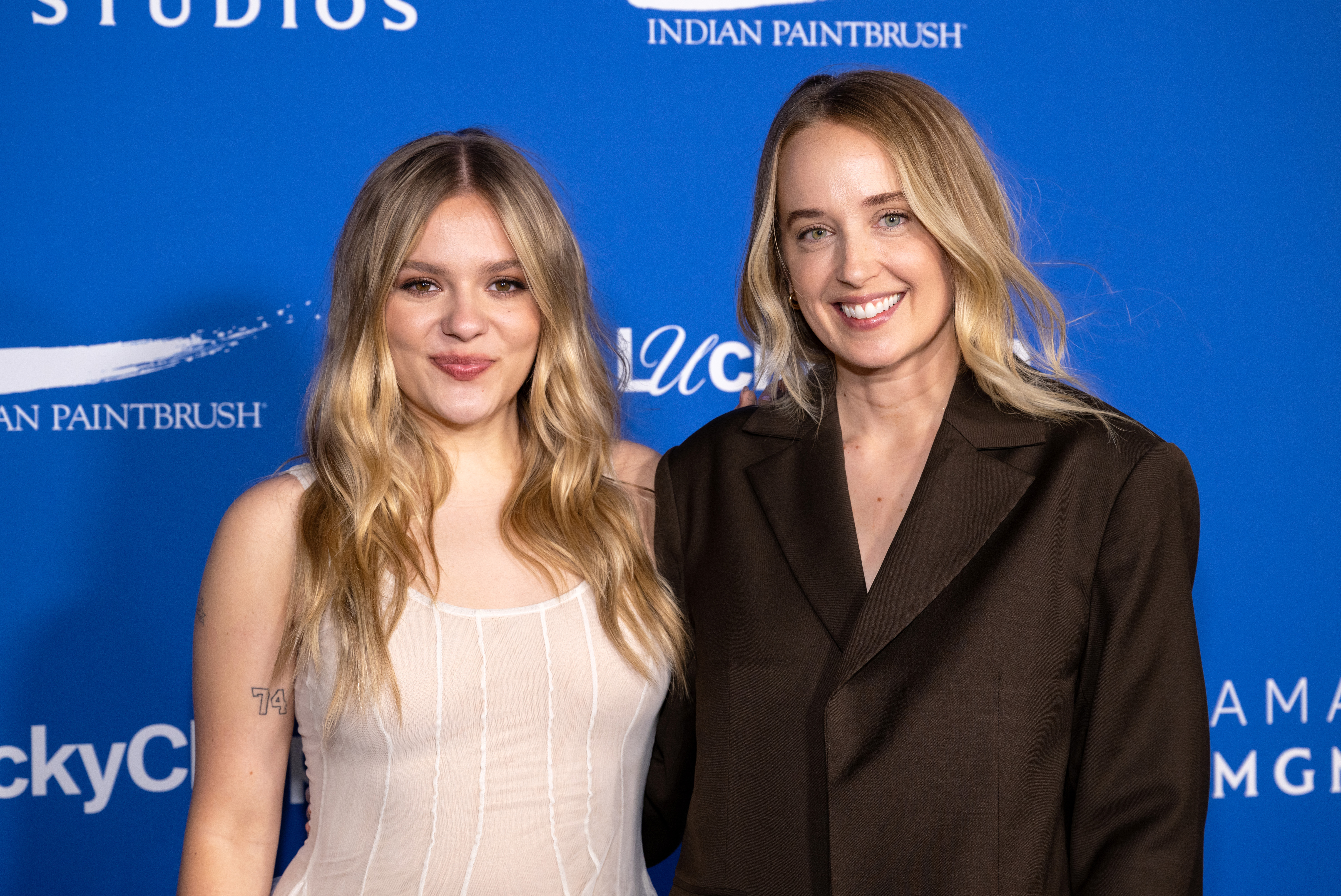
My Old Ass star Maisy Stella and writer/director Megan Park attend a special screening in L.A.
When she began writing My Old Ass, Park says that her guiding light was the bittersweet emotion of those final days in a childhood home, and everything you both lose and gain by taking that first step into adulthood. The director/writer channeled her childhood in crafting the film, setting it at a cranberry farm in the Ontario woodland where she spent idyllic summers as a kid. Between the setting that seems spliced out of time and those universal themes, Park hopes that her film will eventually stand amongst the eternal coming-of-age classics. She says, “Although there is obviously a phone and technology element, we wanted to even minimize how much we were in screens, and just have it feel as grounded and authentic and timeless as we possibly could in every way.”
With My Old Ass out in theaters now, Park chats with Marie Claire about finding the next young superstar in Stella, crafting the film’s standout music moments, and how to make a truly authentic Gen Z movie.
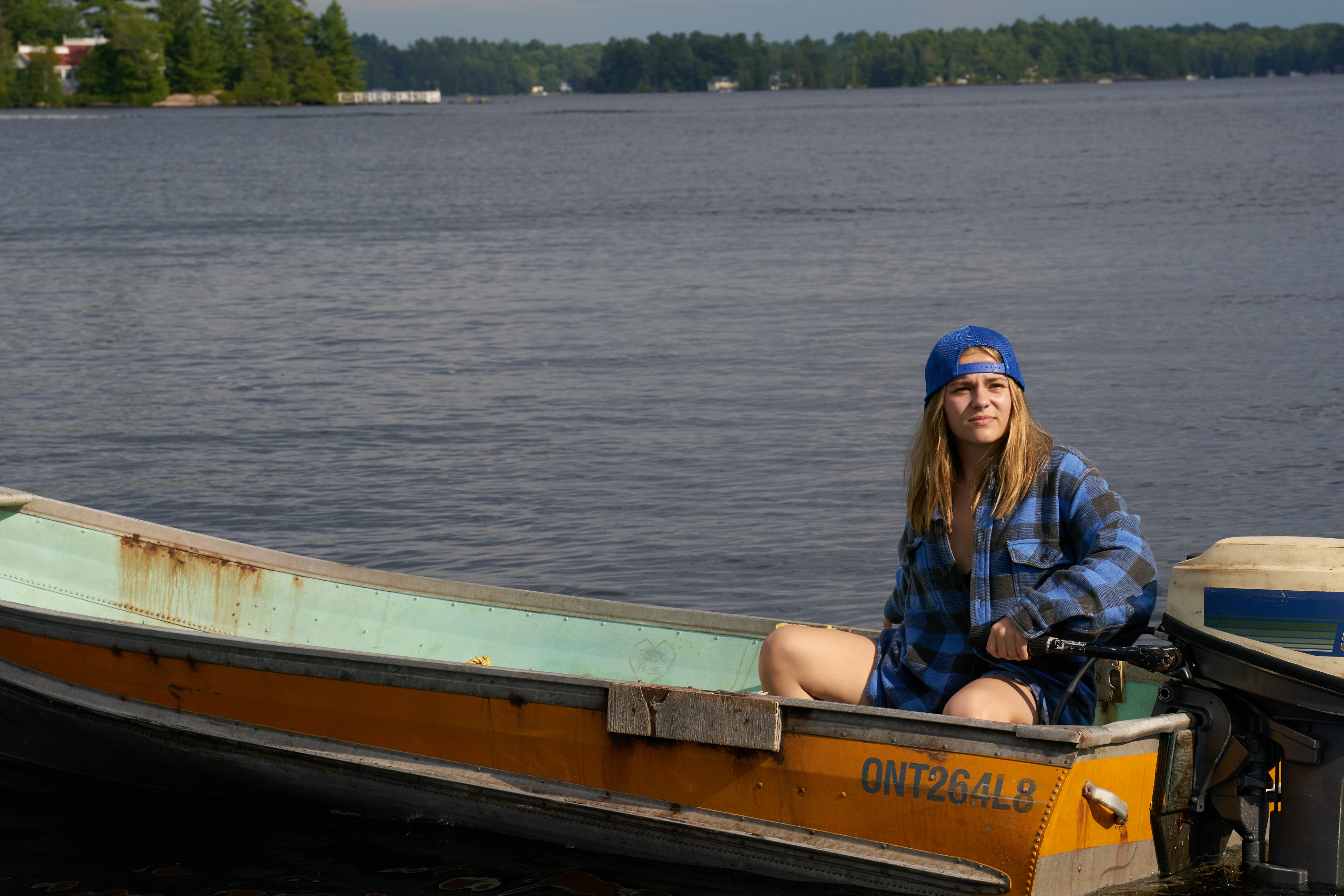
To tell Elliott's (Maisy Stella) story, Park was inspired by filmmakers "who are able to walk that line of making you laugh and making you cry, and wearing their heart on their sleeve in their films."
Marie Claire: When you began writing the script, were you focusing on the themes of love and how growing up feels, or was that something that came naturally as you discovered the characters?
Megan Park: I honestly didn't know what I was doing. I'm such an emotionally driven writer that I couldn't stop thinking about this nostalgic idea that there was a last time I did everything in my childhood. Whether it was the last time my entire family was sleeping under the same roof in my childhood at home or the last time I was making dance videos to Spice Girls with my friends. I couldn't stop thinking about that feeling, and that was really where the idea started.
Get exclusive access to fashion and beauty trends, hot-off-the-press celebrity news, and more.
Then, of course, I also had this idea of wanting to make a movie that felt very timeless but was also a coming-of-age film for now. I'm really inspired by directors like Chris Columbus who are able to walk that line of making you laugh and making you cry, and wearing their heart on their sleeve in their films. As a filmmaker, I grew up on movies like that, and I love movies like that. So there was definitely a tone North Star during the whole process for me, but the story really evolved. The mushroom trip and all that came later as the entry point.
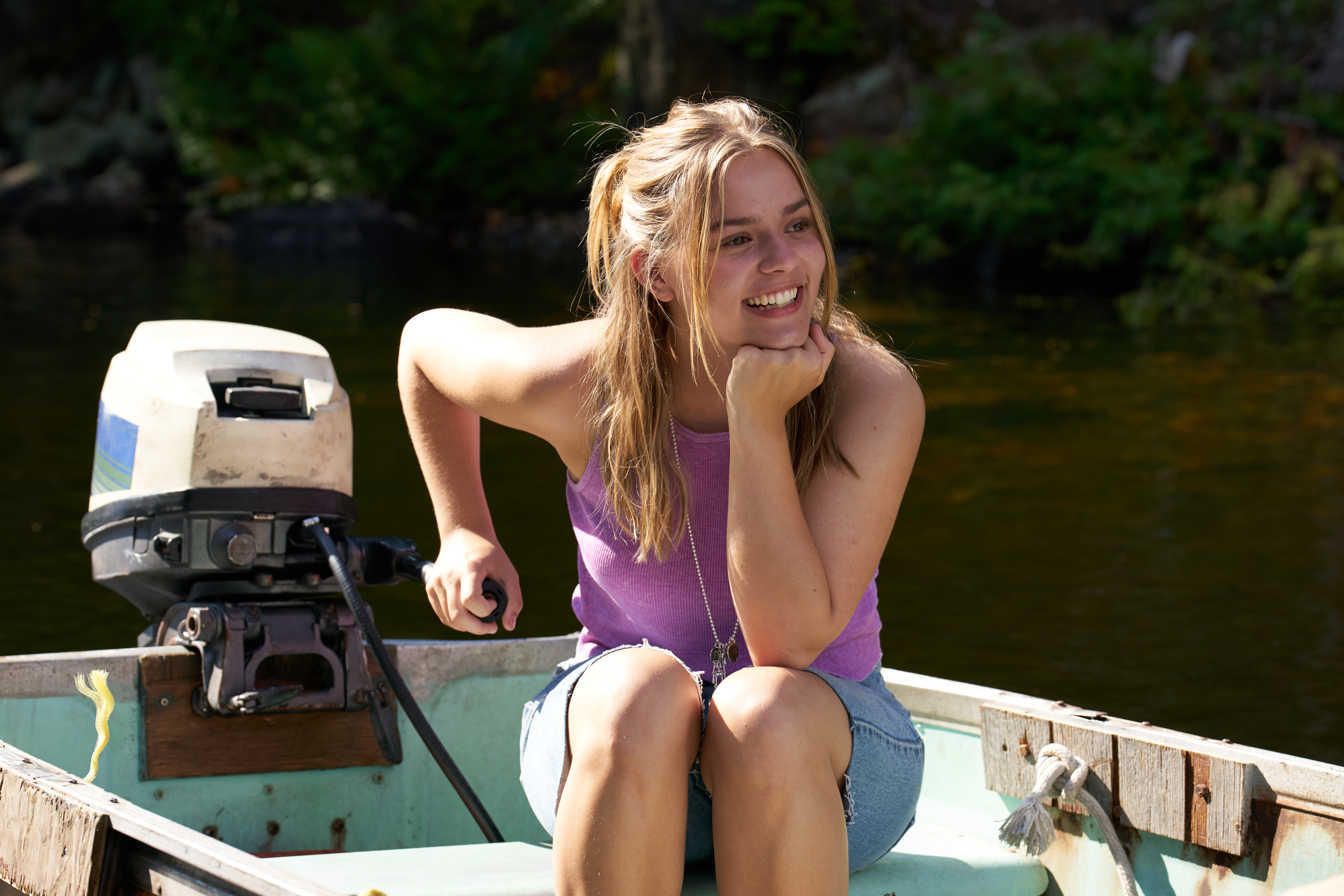
Park says of star Maisy Stella, "After day one, take one, I was like, 'Holy shit, this girl is such a star.'"
MC: How did you approach casting for My Old Ass, with finding Maisy Stella and the film as a whole?
MP: What was so exciting to me about Maisy was she's really grounded and cool, and so typical Gen Z in so many beautiful ways, but she also has this really special light and positivity and power and joie de vivre that I often don't see represented on-camera in young female characters. There was something really magnetic about all those qualities being in one really strong, interesting, flawed young woman. Maisy not only embodied that, but she was able to put that into Elliott and bring Elliott to life in a way I honestly never thought possible. After day one, take one, I was like, 'Holy shit, this girl is such a star.'
I had the exact same feeling I had working with Jenna Ortega on The Fallout. This was Maisy's first movie, and Jenna had obviously worked for quite a while before, but the depths of where these actors can go is so insane to me and so beautiful. I knew that, for Jenna, the world was her oyster, and I feel the same way about Maisy. I'm just so excited to watch her career explode the same way that Jenna's has.
MC: And then you have Aubrey Plaza being amazing and playing My Old Ass even though she isn't even 40.
MP: Iconic. With Aubrey's role initially, we were getting so caught up in who looks the most like Maisy. At the end of the day, it came down to, ‘Who is a great energy match? Who's going to have that chemistry? Who am I a fan of?’ And I'm a huge fan of Aubrey's. I wanted to work with her. I wanted to see her on that log with Maisy, and I knew Maisy felt the same way. The second we got them together, it was just like magic.
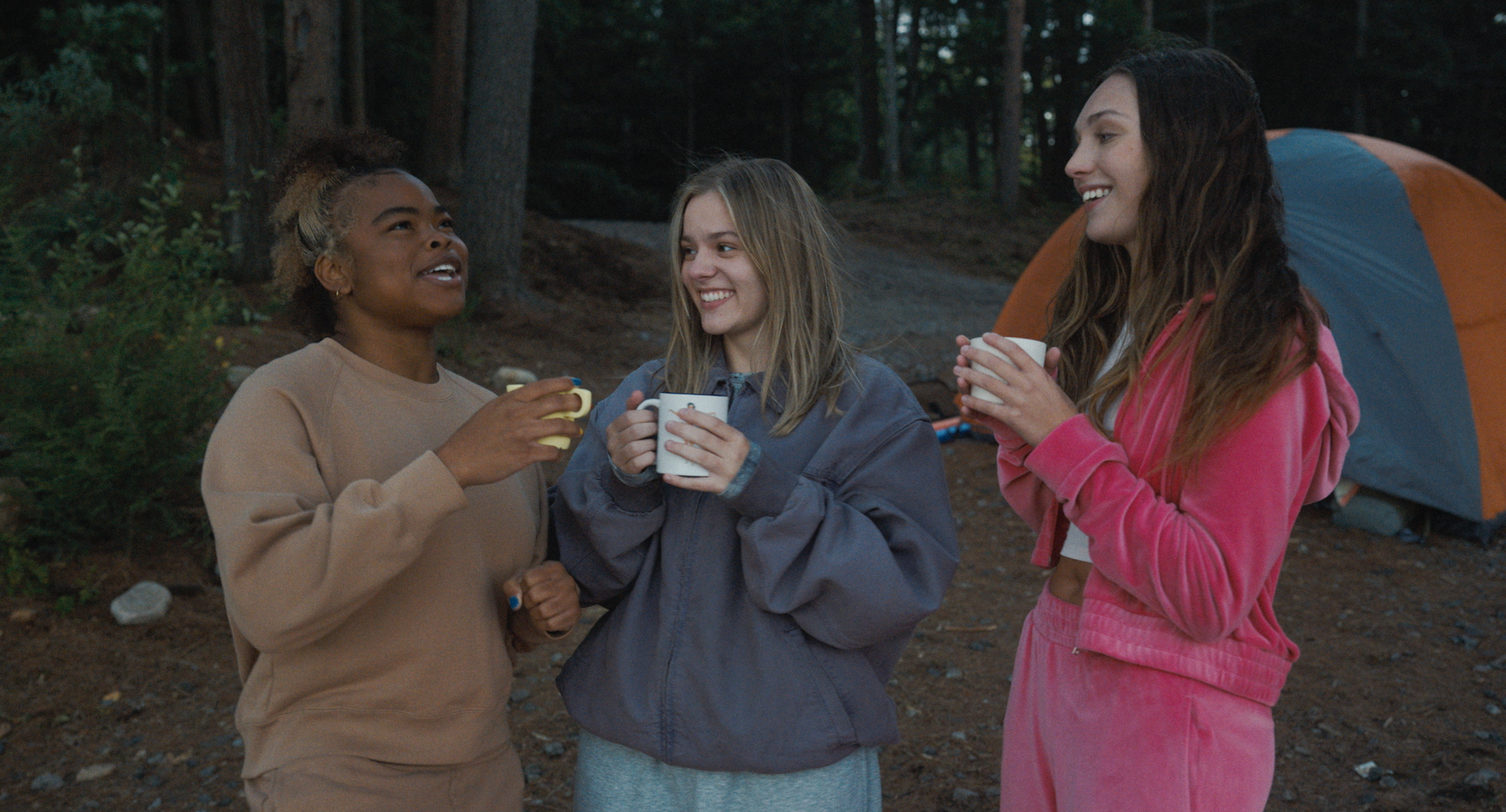
Elliott (Maisy Stella, center) with her besties Ro (Kerrice Brooks, left) and Ruthie (Maddie Ziegler, right), preparing to take mushrooms in My Old Ass.
MC: You have two significant music drops: “Say It Right” by Nelly Furtado and “One Less Lonely Girl” by Justin Bieber. Were those songs in the script? How did those music moments come to be?
MP: “One Less Lonely Girl” was not in the first script. It had a different song for that moment that didn't get cleared because of the drug element of it. I actually went to Maisy and I was like, 'What is an iconic moment or concert from your childhood?' And it was within the same breath. She was like, ‘Justin Bieber, “One Less Lonely Girl.”' And I was like, 'Oh shit.' And then we watched the Never Say Never movie together and I was like, 'Okay, yeah.' Then I had the idea of, ‘What if you are Justin, and Chad becomes the one less lonely girl.’ At this point, we had Kerrice [Brooks] and Maddie [Ziegler] who are professional background dancers, so I was like, we have to take advantage of this. Maisie can sing. This is too good to be true. We did have to get it approved by Bieber's team, even after we shot it. We were taking a big swing because if he hadn't approved it, that would've been a huge bummer. But luckily he did, which we were excited about.
All the other music drops in the movie, it's an all-Canadian soundtrack. It was a mix of songs like “Say It Right;” when I was younger, that was such a song from my young adulthood. And then Maisy introduced me to some of the other artists like Andy Shauf and Leith Ross, who are amazing young Canadian artists. So it's a mix of Old Ass and Young Ass playlist combined.
MC: I loved the subversion in the latter part of the movie when the big coming-of-age moment is Elliott realizing that she has a romantic attraction for a guy. That's a very different way of looking at sexuality than has traditionally been depicted on screen.
MP: It was really a fun thing to explore. We wanted to make sure it never felt like, 'I'm gay and now I'm straight.' That’s not the story and that's not what she goes through. It was interesting to me that there was a young woman who was very sure about her identity. She identified as somebody who was only attracted to women. And then in meeting this man, she questions maybe if she's pan or bi. It's a conversation of evolving labels and, in a sense, a reverse coming out. There's a bit of embarrassment about that, which I think is interesting. But it was really cool to speak with so many people involved in the film and in the queer community who were like, 'Thank you. There hasn't been this kind of representation in a coming-of-age film that I've seen before, and this was really truthful to my experience.'
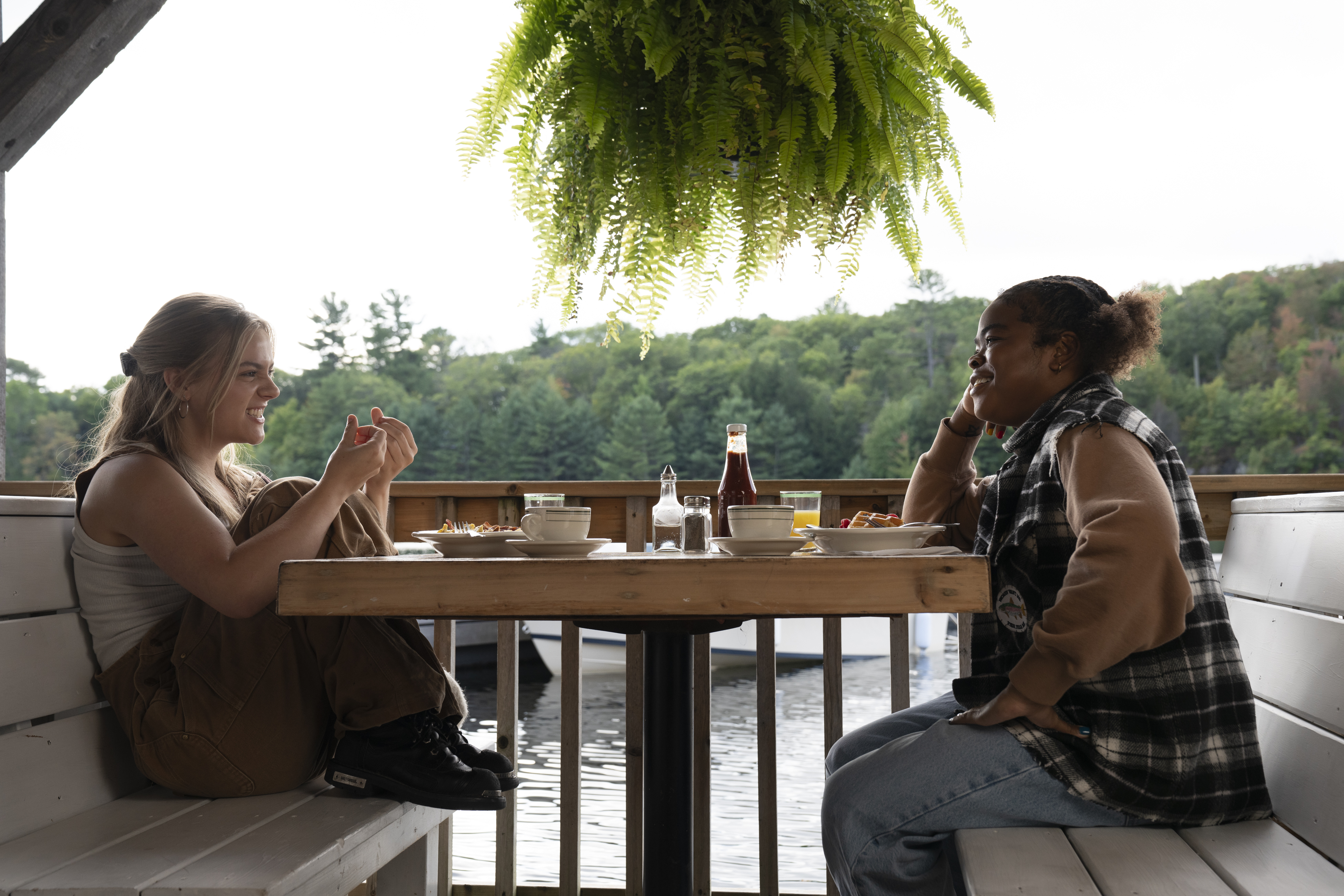
Elliott (Maisy Stella, left) and Ro (Kerrice Brooks, right) have a girl talk, in My Old Ass.
MC: There are these hints of what the future that Old Elliott is living in throughout the movie, that are kind of dystopian. How did you approach inserting those asides into the story?
MP: Some of those things, like the Penelope Disick line, were already in the script. But once we had the locked movie, it became really important to walk the line of how much we could let people into what was happening in Old Elliott's world without unraveling the thread of how [the time travel] is all working. Our editor Jen Vecchiarello is such a genius and really was my partner-in-crime in that whole process in the edit. With the voiceover phone calls between the Elliotts, we were able to play around with teasing those moments and having fun with them without it being too heavy-handed or serious, or making it too Sliding Doors-y.
MC: Early in the film, Elliott has an excellent line in which she mentions she’s “still trying to have hope” while living in a world that’s on fire and full of “uneducated racists.” In the end, this movie is very hopeful while also recognizing how difficult life can be. How did you come to strike that balance of realistic hope?
MP: That really is life, you know? Good and bad go hand in hand. That's really the tragedy and also the beauty of life. What's interesting about younger and older Elliott and what they learn from each other is that younger Elliott is hopeful. She is young and dumb. That’s what allows her to live so freely, and older Elliott is reminded of that. You get older and you get sometimes more anxious and afraid. You've been through stuff. You know what pain feels like, and you're trying to do anything you can to avoid it. But when you're young, you're not thinking about that as much. I even see that in my 4-year-old daughter in different ways. There's this bravery and this wide-eyed excitement for things. I think it's a really beautiful thing to be around and to be reminded of. That's ultimately the big theme that we wanted to infuse in the movie, those two conflicting feelings always go hand in hand.
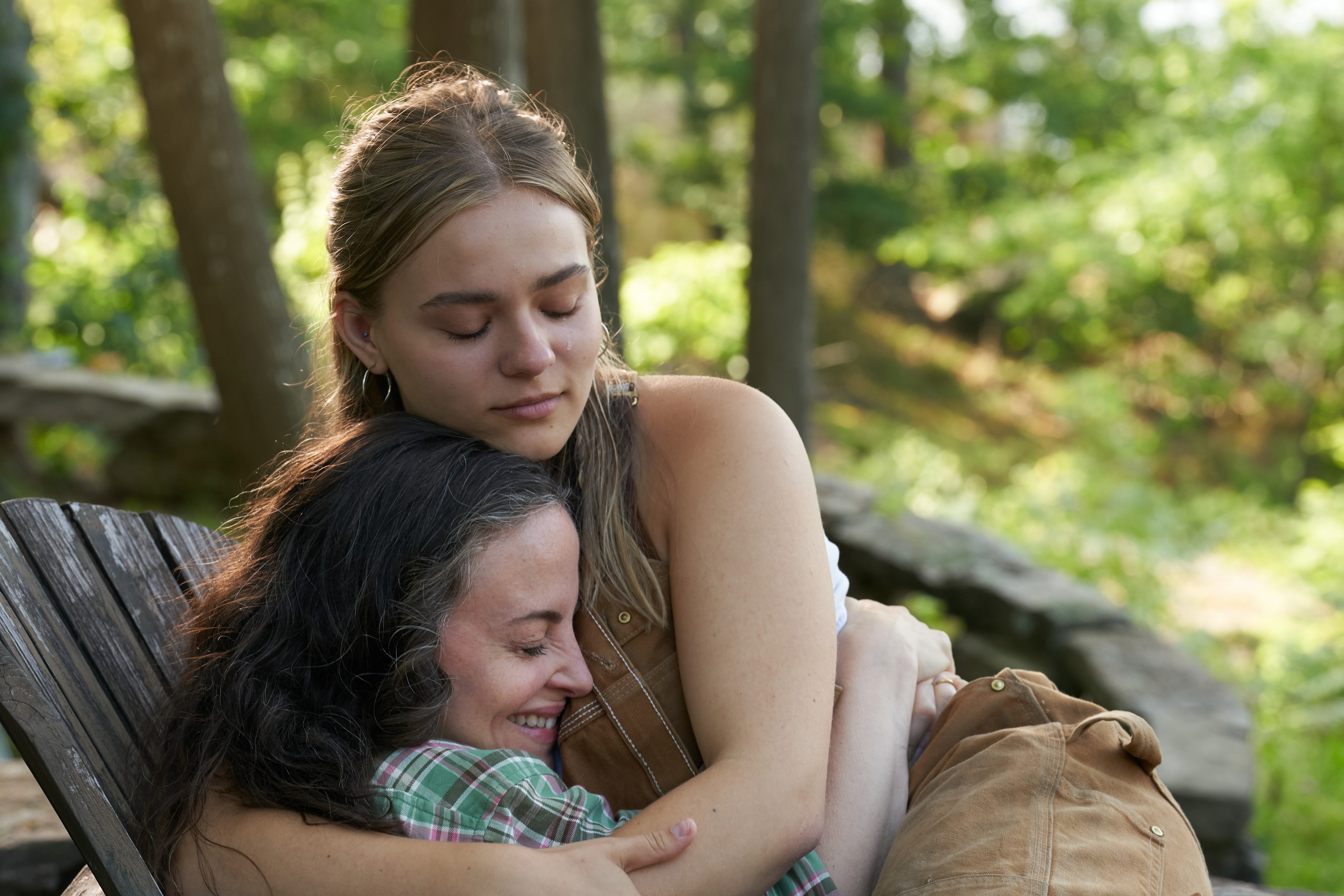
Elliott (Maisy Stella) hugs her mother Kath (Maria Dizzia), in My Old Ass.
MC: In your directorial career so far with The Fallout and now My Old Ass, you make these films that are very authentic looks into like the minds of teenagers and young people. How has it been like navigating Hollywood with that focus on coming-of-age films?
MP: It's weird because it was never really my intention. I didn't set out like, 'Oh, I wanna make movies about this.' But I think when I made The Fallout, as a millennial who grew up in Canada and then moved to America, I never felt afraid to go to school. I was so lucky. Then I moved to the U.S., and I was talking to people who had kids that age or who were in school. I was like, 'Wait, this is just happening? This is just how it is?' I kept thinking I would not be able to go to school every day. I would be too scared. It was that disgust and that horror that made me want to tell that story truthfully, because I could not believe that that is the reality. So of course that movie had to be centered around a young person, because school shootings and being a Gen Z go hand in hand in the conversation, unfortunately.
With My Old Ass, I wanted to explore these big themes of life and time and loss and regret. In my mind, it was always a two-hander. I certainly relate more to Old Elliott now, but even though she's not on camera as much, the movie in a weird way is her takeaway. It was a more hopeful world to be in, to be with younger Elliott for the majority of the film. It was a lighter head space, and it was really fun to be in that world.
I really enjoy and take seriously trying to write authentically for Gen Z. I hope to do more of it. It's not the only thing I'm probably going to do as a filmmaker, but I really feel like it's an underserved market. A lot of people try to write a movie for Gen Z, but I think the second you're trying to write 'a Gen Z character' instead of just a human, or just telling a human story, it's like they can sniff that out. We can all sniff it out; it just loses some of its authenticity, and feels like you're pandering to them or something.
This interview has been edited and condensed for clarity.
Quinci LeGardye is a Culture Writer at Marie Claire. She currently lives in her hometown of Los Angeles after periods living in NYC and Albuquerque, where she earned a Bachelor’s degree in English and Psychology from The University of New Mexico. In 2021, she joined Marie Claire as a contributor, becoming a full-time writer for the brand in 2024. She contributes day-to-day-content covering television, movies, books, and pop culture in general. She has also written features, profiles, recaps, personal essays, and cultural criticism for outlets including Harper’s Bazaar, Elle, HuffPost, Teen Vogue, Vulture, The A.V. Club, Catapult, and others. When she isn't writing or checking Twitter way too often, you can find her watching the latest K-drama, or giving a concert performance in her car.